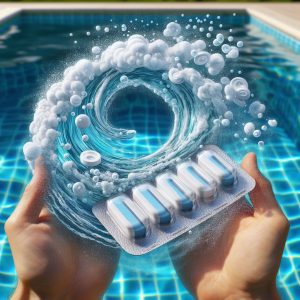Expanding the original article with product details and a focus on pool chlorine tablets involves integrating technical specifications, market dynamics, and consumer insights into each stage of the product lifecycle. Here’s a more detailed exploration:
Chlorine tablets are indispensable in maintaining the hygiene and safety of pool water, effectively eliminating bacteria and algae. Their development and distribution, however, entail a comprehensive understanding of market needs, regulatory compliance, and environmental impact. As the market for pool maintenance evolves, manufacturers of chlorine tablets are challenged to innovate while ensuring their products are safe, effective, and environmentally sustainable.
Product Planning
In the planning stage, manufacturers conduct detailed market research to understand the specific needs of different pool owners, from residential pools to commercial aquatic facilities. This involves analyzing preferences for tablet size—ranging from 1-inch tablets for smaller, above-ground pools to 3-inch tablets for larger, in-ground pools. Packaging options also vary, with some consumers preferring individually wrapped tablets for safety and convenience, while others look for bulk packaging to reduce waste and cost.
Regulatory requirements are stringent, with agencies such as the EPA in the United States setting strict guidelines on the composition and efficacy of chlorine tablets to ensure they effectively sanitize pool water without harming the environment. Collaboration between R&D, marketing, and compliance teams is crucial to design a product that not only meets these standards but also aligns with consumer expectations for performance and ease of use.

Product Development
The development phase is marked by intense R&D efforts to create a formulation that maximizes the disinfecting power of chlorine while minimizing undesirable by-products, such as chloramines, which can cause skin and eye irritation. Manufacturers strive to develop stabilized chlorine tablets that resist degradation from UV light, extending their effective life in pool water and reducing the frequency of application.
Safety testing is paramount, with products undergoing rigorous evaluation to ensure they do not pose hazards to users or the environment. This includes testing for dissolution rate, which is critical to ensuring the tablets provide a consistent release of chlorine, avoiding spikes or dips in pool chlorine levels that could compromise swimmer safety.
Product Promotion
Promoting chlorine tablets effectively requires educating the market on the advantages of the product over alternative pool sanitizers, such as liquid chlorine or saltwater systems. Manufacturers invest in digital marketing campaigns that highlight the convenience, efficacy, and cost-effectiveness of using chlorine tablets, featuring testimonials from satisfied customers and endorsements from pool maintenance professionals.
Training and support for retailers and pool service providers are also essential, equipping them with the knowledge to advise customers on product selection and proper use, including dosing and safety precautions. Promotional events, such as in-store demonstrations and online webinars, offer opportunities to engage directly with end-users, showcasing the benefits of chlorine tablets in maintaining pool water quality.
Product Phase-out
Deciding to discontinue a chlorine tablet product involves careful consideration of market trends, sales data, and customer feedback. Manufacturers may phase out products that no longer meet consumer needs or have been surpassed by more advanced formulations. Clear communication with stakeholders is vital to manage the phase-out process smoothly, offering discounts or trade-in programs to encourage users to switch to newer, more effective products.
Feedback collected during this stage is invaluable for informing the development of future products, with manufacturers analyzing customer preferences, performance issues, and competitive pressures to guide the innovation of next-generation chlorine tablets that better meet the evolving needs of the pool maintenance market.
Conclusion
The lifecycle management of chlorine tablets reflects the intricate balance between innovation, compliance, and market demand. Manufacturers who navigate these stages effectively can sustainably meet the needs of pool owners, ensuring clean, safe swimming environments. As the industry advances, ongoing investment in R&D, market analysis, and customer engagement will remain key to delivering products that uphold the highest standards of quality and environmental stewardship.





